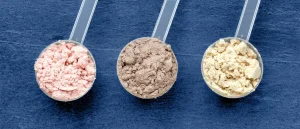AG1: Overhyped Multivitamin or Super Supplement?
- By Sydney Bueckert, NASM C.P.T., C.E.S., F.N.S., G.P.T.S.
- February 22, 2024
In case you missed it, slurping back a daily dose of greens powder is very in right now. And AG1 (aka Athletic Greens) is the clear favorite. With 75 vitamins, minerals, prebiotics, probiotics, adaptogens, antioxidants, and whole food plant-based nutrients per scoop, AG1 beats out most other greens powders by 40+ nutrients. The brand also claims its benefits reach far beyond the average multivitamin to support energy levels, immune health, and gut health. But does it?
The chokehold AG1 has on an endless stream of influencers, athletes, and reputable longevity experts seems promising. Andrew Huberman relies on AG1 as his daily source of probiotics, while Peter Attia swears by the stuff for filling in any missing nutrient gaps (it’s worth noting both are sponsored to say so).
However, cell biologist Rhonda Patrick, Ph.D., recently slammed AG1 as nothing more than an expensive ($79/month) multivitamin. “AG1 is a multivitamin. Nothing more. It shouldn’t replace your intake of leafy greens. Also, the probiotic dose is quite minuscule,” Patrick said in a recent X post. Woof.
AG1 is a multivitamin
— FoundMyFitness Clips (@fmfclips) February 19, 2024
Nothing more
It shouldn't replace your intake of leafy greens
Also, the probiotic dose is quite minuscule pic.twitter.com/2sewfp3Gby
So, is AG1 worth it? Here’s what registered dietitians have to say.
About the Experts:
Alix Turoff, MS, R.D., NASM-CPT a registered dietitian and certified personal trainer with a passion for science-based nutrition and mindful eating.
Imashi Fernando, MS, R.D., CDCES is a registered dietitian who works in a large hospital system as a clinical dietitian and provides one-on-one nutrition counseling.
Kelsey Costa, MS, RDN, a registered dietitian and nutrition consultant for Diabetes Strong, Inc.
Matthew Kadey, MS, R.D. is a registered dietitian and nutrition writer for Men’s Health, Muscle & Fitness, Runner’s World, Triathlete, and more.
Is AG1 Worth It?
If you’re looking for a solid greens powder to knock out a multivitamin and general probiotic, AG1 might fit the bill. AG1 covers your daily needs for vitamins C and E, B vitamins, and zinc, as well as several other nutrients. It’s also free of added sugar and artificial ingredients.
A single serving contains 7.2 billion CFU of two strains of probiotics that are popular picks for general gut health: Lactobacillus acidophilus and Bifidobacterium bifidum (1, 2). “Most studies recommend at least 1 to 10 billion CFUs for health maintenance, and AG1 hits right in the middle of the spectrum (3),” explains registered dietitian Imashi Fernando, MS, R.D.
That said, you might be better off taking a regular ol’ multivitamin, eating more fruits and vegetables, and taking a probiotic specific to your needs *if* you need one.
“The scientific support for greens supplements as a whole is notably lacking,” says Kelsey Costa, MS, R.D. “AG1 provides minimal fiber (two grams), and it is unclear if it offers equivalent levels of biochemicals, enzymes, and microorganisms compared to whole fruits and vegetables.” Meaning, it isn’t a sub for fresh produce. It also fails to hit the mark on several key nutrients, like calcium, magnesium, vitamin D, and omega-3’s.
The probiotics in AG1 may also not be right for everyone, according to registered dietitian Alix Turoff, MS, R.D., CPT. “The efficacy of a probiotic is both strain and disease-specific which means that you need to know what you’re treating to know which strain is best for you,” she says. In other words, someone who has diarrhea is going to need a different probiotic than someone who wants to clear up eczema.
AG1 Pros and Cons at a Glance
There are a handful of reasons why AG1 may or may not be worth the splurge:
Pros
- Provides the daily value for many essential vitamins and minerals
- Includes 7.2 billion CFUs of probiotics
- Excludes artificial colors, flavors, preservatives, and sweeteners
- Vegan-friendly, non-GMO, and suitable for many food allergies
NSF Certified for Sport and CGMP compliant
Cons
- Expensive
- Lack of research to confirm safety or effectiveness
- Does not contain vitamin D or omega-3’s
- Lacks meaningful amounts of essential minerals like calcium and magnesium
- Doesn’t list exact ingredient amounts for proprietary blends
- Not a viable replacement for whole fruits and vegetables
- Not suitable for people on certain medications, or with certain health conditions
What’s Good About AG1?
AG1 claims to have several potential benefits. The problem: Many are linked to test tube studies, funded by AG1. Here’s what we actually know:
Provides several essential nutrients
“One serving of AG1 provides more than 100 percent of the DV for several vitamins and minerals, including vitamins C and E, B vitamins, and zinc,” says registered dietitian Matthew Kadey, MS, R.D. So, like a multivitamin, AG1 could be a potentially convenient way to fill in micronutrient gaps in your diet.
May boost energy
If you’re always tired, you might be low in B vitamins like vitamin B12. All eight B vitamins (save folate) play an important role in energy production (4). If you fail to get enough B vitamins through your diet alone, AG1 knocks out 100 percent of all eight.
May support gut health
If you don’t have any specific gut concerns, AG1 might be a decent probiotic option. Bifidobacterium bifidum and Lactobacillus acidophilus—the probiotics in AG1—are two probiotic strains to look for in a general probiotic, gut health doctor Neil Paulvin, D.O. previously told The Edge. AG1 also contains 7.2 billion CFU, which hits somewhere in the middle of the recommended 1 to 10 billion CFUs for general health (3).
Third-party tested
AG1 is CGMP compliant, which means it’s third-party tested to ensure that it’s safe and has the ingredients and amounts it claims to have. It’s also NSF Certified for Sport—which ensures that AG1 is free of substances banned by most competitive sport organizations. The NSF stamp also indicates that AG1 has been tested for purity and potency.
Diet and allergy-friendly
AG1 includes no GMOs, sugar, gluten, pesticides, or artificial ingredients. It’s also free of gluten, dairy, corn, egg, peanuts, and lactose making it a good match for several dietary patterns, including:
Low calorie
“AG1 is fairly low calorie, so it’s not going to put a big dent in your day,” says Turoff. One serving contains 50 calories, six grams of carbs, two grams of fiber, and two grams of protein—leaving plenty of room to fuel up with real, whole foods.
What’s Not So Good About AG1?
AG1 may not be right (or necessary) for everyone. Here’s why:
Lack of research to confirm safety and effectiveness
“While many of AG1’s individual ingredients are backed by research suggesting health benefits, there is no research specifically on AG1 to support its effectiveness,” says Costa.
AG1 also doesn’t list individual dosages for the nutrients packed into its three proprietary blends (“Alkaline, Nutrient-Dense Raw Superfood Complex,” “Nutrient Dense Extracts, Herbs, and Antioxidants,” and “Digestive Enzyme and Super Mushroom Complex”). This makes it impossible to know whether you’re getting an effective dose of any of those ingredients, says Turoff.
Fernando also warns the lack of transparency could be a red flag for people who are sensitive to any of the ingredients found in the blends—such as people on certain medications, with certain health conditions like diabetes or high blood pressure.
Not a substitute for whole fruits and vegetables
The company markets AG1 as having the same antioxidant content as 12 servings of fruit and vegetables. While AG1 may provide some of the nutrients found in fresh fruit and veggies, there’s currently not enough evidence to show that consuming them in powdered form has the same benefits as eating whole foods.
“It’s a safe bet that these powders are not a direct substitute for the antioxidants you get from whole vegetables and fruits,” says Kadey. Why? According to Fernando, whole fruits and vegetables naturally contain optimal amounts of nutrients and antioxidants that exert a synergistic effect on health. It’s unclear whether AG1 packs the same punch.
Plus, AG1 fails to offer the fiber that you would get from eating fresh produce. “When you eat actual fruits and vegetables, you get the benefit of satiety in addition to the vitamins and minerals,” says Turoff. Fiber helps to slow down digestion and balance blood sugar levels, keeping you energized and satisfied for hours. The USDA recommends that adults consume 22 to 34 grams of fiber per day, but a scoop of AG1 only provides two grams of fiber (5).
May not help with specific gut problems
Some people do not need and cannot tolerate certain probiotics, says Turoff. “There is a possibility that the probiotics in AG1 may not be the right strains of microorganisms or in the amounts needed for you,” explains Kadey.
It really comes down to what you need a probiotic for. If you have general needs, AG1 might be okay. But if using a probiotic for a specific issue, you’ll need a specific probiotic for that issue. For example, L. bulgaricus (one of the probiotics in Activia yogurt) is effective for IBS; while, L. rhamnosus GG (LGG) is effective for diarrhea sparked by taking an antibiotic (6). “CFU recommendations will also differ based on what you are trying to treat, ” explains Turoff.
AG1 also contains prebiotics, which can help boost the strength and integrity of new and existing beneficial microbes in your gut (7). That said, because the prebiotics in AG1 are in the proprietary blends, there’s no way to know if they’re included at an effective dose.
Lacks some essential nutrients
AG1’s biggest selling point is that it’s a solid multivitamin; but unfortunately, it won’t cover all your needs. AG1 contains low levels of important micronutrients like calcium and magnesium, which most of us fail to get enough of (8, 9). It’s also completely void of vitamin D, iron, and omega-3’s.
While you might need more vitamin D if you fail to get enough sun, Fernando actually likes that AG1 left iron out of the mix. “Iron needs are highly variable. Iron supplements can also often have GI side effects (like constipation or diarrhea), and since iron and calcium compete for absorption, it’s best to take an iron supplement separate from a multivitamin that contains calcium,” she explains.
The Bottom Line
AG1 may offer a convenient (but expensive) way to help fill nutrient gaps in your diet. As one of the best greens powders on the market, AG1 packs 75+ plant-based nutrients and many (but not all) essential vitamins and minerals. It’s also third-party tested, and is free of unwanted additives like sugar, artificial ingredients, and GMOs.
That said, AG1 should not be used as a replacement for whole fruits and vegetables. Since most of its ingredients are present in proprietary blends, it’s impossible to know whether AG1 contains effective or safe doses of those ingredients. While the pre- and probiotics in AG1 might boost gut health, it may not be suitable for individual gut health needs. And since AG1 fails to contain adequate levels of vitamin D, iron, omega-3’s, calcium, and magnesium you may need to add several other supplements to your stack to meet your needs.
References
1. Chen, J. et al. (2021). Recent Development of Probiotic Bifidobacteria for Treating Human Diseases.
2. Gao, H. et al. (2022). The Functional Roles of Lactobacillus acidophilus in Different Physiological and Pathological Processes.
3. Gurram, S. et al. (2021). Insights on the Critical Parameters Affecting the Probiotic Viability During Stabilization Process and Formulation Development.
4. Tardy, A. et al. (2020). Vitamins and Minerals for Energy, Fatigue, and Cognition: A Narrative Review of the Biochemical and Clinical Evidence.
5. USDA (2020). Dietary Guidelines for Americans 2020-2025.
6. Ciorba, M. et al. (2012). A Gastroenterologist’s Guide to Probiotics.
7. Davani-Davari, D. et al. (2019). Prebiotics: Definition, Types, Sources, Mechanisms, and Clinical Applications.
8. National Institutes of Health (2024). Calcium.
9. Rosanoff, A. et al. (2012). Suboptimal Magnesium Status in the United States: Are the Health Consequences Underestimated?














